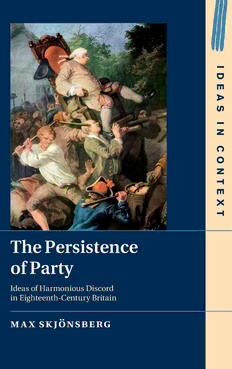Table Of ContentTHE PERSISTENCE OF PARTY
Politicalpartiesaretakenforgrantedtoday,buthowwastheideaof
party viewed in the eighteenth century, when core components of
modern, representative politics were trialled? From Bolingbroke to
Burke, political thinkers regardedparty as a fundamental conceptof
politics,especiallyintheparliamentarysystemofGreatBritain.The
paradoxofparty wasbestformulatedbyDavidHume:whileparties
often threatened the total dissolution of the government, they were
alsothesourceoflifeandvigourinmodernpolitics.Intheeighteenth
century,partywasusuallyunderstoodasasetofflexibleandevolving
principles, associated with names and traditions, which categorised
and managed political actors, voters, and commentators. Max
Skjönsberg thus demonstrates that the idea of party as ideological
unity is not purely a nineteenth- or twentieth-century phenomenon
but canbe traced totheeighteenth century.
ö is a postdoctoral research associate in the
DepartmentofHistoryattheUniversityofLiverpool.Anintellectual
and political historian of the eighteenth century, he has published
articles in The Historical Journal, Journal of British Studies, History
of Political Thought, Modern Intellectual History, and History of
European Ideas. He has previously lectured in history and political
theoryattheUniversityofStAndrewsandtheUniversityofYork.In
additiontobeingawardedtheSkinnerPrizefromtheUniversity
ofLondon,hewasDavidHumeFellowattheInstituteforAdvanced
Studies intheHumanities at TheUniversityof Edinburgh in,
andreceivedtheParliamentaryHistoryEssayPrizein.
Edited byDavid Armitage, Richard Bourke and JenniferPitts
Thebooksinthisserieswilldiscusstheemergenceofintellectualtraditionsandof
related new disciplines. The procedures, aims and vocabularies that were gener-
atedwillbesetinthecontextofthealternativesavailablewithinthecontemporary
frameworksofideasandinstitutions.Throughdetailedstudiesoftheevolutionof
such traditions, and their modification by different audiences, it is hoped that a
new picture willform of thedevelopment ofideas intheir concrete contexts. By
thismeans,artificialdistinctionsbetweenthehistoryofphilosophy,ofthevarious
sciences, of society and politics, and ofliterature maybe seen to dissolve.
The series ispublished with the support of the ExxonFoundation.
A full list oftitles inthe series can be found at:
www.cambridge.org/IdeasContext
THE PERSISTENCE OF PARTY
Ideas of Harmonious Discord in Eighteenth-Century Britain
MAX SKJÖNSBERG
UniversityofLiverpool
UniversityPrintingHouse,Cambridge,UnitedKingdom
OneLibertyPlaza,thFloor,NewYork,,USA
WilliamstownRoad,PortMelbourne,,Australia
–,rdFloor,Plot,SplendorForum,JasolaDistrictCentre,NewDelhi–,India
AnsonRoad,#–/,Singapore
CambridgeUniversityPressispartoftheUniversityofCambridge.
ItfurtherstheUniversity’smissionbydisseminatingknowledgeinthepursuitof
education,learning,andresearchatthehighestinternationallevelsofexcellence.
www.cambridge.org
Informationonthistitle:www.cambridge.org/
:./
©MaxSkjönsberg
Thispublicationisincopyright.Subjecttostatutoryexception
andtotheprovisionsofrelevantcollectivelicensingagreements,
noreproductionofanypartmaytakeplacewithoutthewritten
permissionofCambridgeUniversityPress.
Firstpublished
AcataloguerecordforthispublicationisavailablefromtheBritishLibrary.
LibraryofCongressCataloging-in-PublicationData
:Skjönsberg,Max,–author.
:Thepersistenceofparty:ideasofharmoniousdiscordineighteenth-centuryBritain/Max
Skjönsberg.
:Cambridge,UnitedKingdom;NewYork,NY:CambridgeUniversityPress,.
|:Ideasincontext|Includesbibliographicalreferencesandindex.
:(print)|(ebook)|
(hardback)|(paperback)|(epub)
:LCSH:Politicalparties–GreatBritain–History–thcentury.|Partyaffiliation–Great
Britain–History–thcentury.|Politicalculture–GreatBritain–History–thcentury.
|GreatBritain–Politicsandgovernment–thcentury.
:.(print)|(ebook)|./–dc
LCrecordavailableathttps://lccn.loc.gov/
LCebookrecordavailableathttps://lccn.loc.gov/
----Hardback
CambridgeUniversityPresshasnoresponsibilityforthepersistenceoraccuracy
ofURLsforexternalorthird-partyinternetwebsitesreferredtointhispublication
anddoesnotguaranteethatanycontentonsuchwebsitesis,orwillremain,
accurateorappropriate.
To Janet
Contents
List of Figures page ix
Acknowledgements x
Note on the Text xii
List of Abbreviations xiii
Introduction: Party in History and Politics
Background, Contexts, and Discourses
Rapin on the Origins and Nature of Party Division
in Britain
Bolingbroke’s Country Party Opposition Platform
David Hume’s Early Essays on Party Politics
Faction Detected? Pulteney, Perceval, and the Tories
Hume on the Parties’ Speculative Systems of Thought
Hume and the History of Party in England
Political Transformations during the Seven Years’
War: Hume and Burke
‘Not Men, But Measures’: John Brown on Free
Government without Faction
Edmund Burke and the Rockingham Whigs
Burke’s Thoughts on the Cause of the Present Discontents
vii
viii Contents
Burke and His Party in the Age of Revolution
Burke and the Scottish Enlightenment
Conclusion
Bibliography
Index
Figures
. An Election Entertainment () page
. Canvassing for Votes ()
. The Polling ()
. Chairing the Member ()
All of the above are part of William Hogarth’s series
of election paintings.
ix

